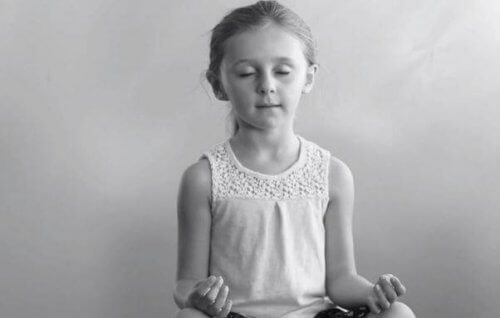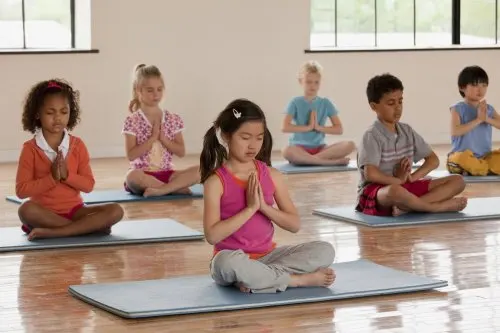Meditation for Children: An Alternative to Punishment

What would happen if we let children meditate instead of punishing them? We’ve been following the same discipline regime for many years. However, such punishments have lost credibility.
Now, children laugh every time they stand facing the wall or copy “I will not speak in class again” a hundred times.
Society is moving forward, people are changing, and education and the way we teach are also changing.
Now, it’s time to use one of the methods that help adults (and now children) a lot. It’s time for meditation for children!
The mindfulness room

Here, teachers were encouraged to use meditation instead of punishment.
This special room where the children would go to if they didn’t behave well, didn’t do the homework, or if they got into a fight was called “the mindfulness room“.
You may wonder how this could succeed. In fact, the teachers themselves doubted the benefits of its application.
Children are very rebellious, so sitting, standing still, and just breathing can be quite boring. However, the results of this project were surprising.
The school principal discovered that the students had improved their behavior, were less short-tempered, and were able to reflect on their bad actions.
You should also read this article: 2 Minutes of Meditation for Better Health
Meditation for children
Meditation isn’t just about sitting quietly and thinking. It goes much further than this. It allows you to find yourself, to see how you’re feeling, think about your actions, and ponder your strengths and weaknesses, and so on.
Furthermore, it helps you to calm down and reduce the stress that sometimes permeates our lives. It also distances us from anxiety and unwarranted concerns.
Children are also under great pressure. Sometimes, the anger that makes them fight with others or rebel against their teacher has its origin in a series of activities that surpass them.
Let’s not forget that children need time to enjoy themselves. They, of course, need to be trained on how to behave, but being continuously in class and going to various extracurricular activities can overwhelm them.
Many parents can meditate with their children at home. The problem is that they don’t have the time and they usually don’t bother to learn the precise techniques of this practice to carry it out.

However, what they don’t contemplate is that this practice is both necessary and very beneficial. It’s not a waste of time or something we could do without.
We often look down on meditation because it requires great concentration and an interest in truly getting to know ourselves.
A modern solution
Of course, we continue to give very little thought to cultivating our inner self. Many consider yoga, meditation, and all other activities related to the most spiritual part of ourselves nonsense.
What would you think if we could open our eyes to the benefits of meditation?
You’ll find that meditation benefits children from the first moment they begin to practice it:
- Children learn to be calmer and are able to control their outbursts. They even start having fewer temper tantrums.
- Not only does meditation allow them to be able to focus on the present, forget the past and the future, and live in the now, but it’ll also help them stay focused in class.
- They’ll learn to enjoy and value the little things that they have around them and that they own. In addition, they won’t need to crave what they don’t really need.
- They’ll be able to empathize and better understand their friends as well as be more generous. They’ll put aside the selfishness that is so prevalent in children.
- Also, they’ll get to know themselves better as well as discover how they feel and think. All this will help them to be aware that they sometimes don’t have to point the finger but have to take responsibility for their own actions.
- They’ll learn that mistakes push them to be better and that perfectionism is unattainable. This will enable them to have healthy goals without being frustrated and feeling disappointed.
Before you go read: Teach Children Happiness, Not Perfectionism
As you can see, adults could learn a lot from all these things that meditation teaches children.
Now comes the big question: Would you let your children meditate instead of punishing them?
All cited sources were thoroughly reviewed by our team to ensure their quality, reliability, currency, and validity. The bibliography of this article was considered reliable and of academic or scientific accuracy.
- Napoli, M., Krech, P. R., & Holley, L. C. (2005). Mindfulness training for elementary school students: The attention academy. Advances in School Mental Health Promotion. https://doi.org/10.1007/s10802-010-9418-x
- Wisner, B. L., Jones, B., & Gwin, D. (2010). School-based meditation practices for adolescents: A resource for strengthening self-regulation, emotional coping, and self-esteem. Children and Schools. https://doi.org/10.1093/cs/32.3.150
This text is provided for informational purposes only and does not replace consultation with a professional. If in doubt, consult your specialist.








